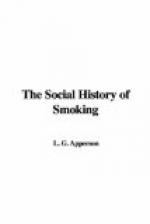This
oval box well filled
With best tobacco, finely
milled,
Beats all Anticyra’s
pretences
To disengage the encumbered
senses.
O
Nymph of transatlantic fame,
Where’er thine haunt,
whate’er thy name,
Whether reposing on the side
Of Oronoco’s spacious
tide,
Or listening with delight
not small
To Niagara’s distant
fall,
’Tis thine to cherish
and to feed
The pungent nose-refreshing
weed,
Which, whether pulverized
it gain
A speedy passage to the brain,
Or whether, touched with fire,
it rise
In circling eddies to the
skies,
Does thought more quicken
and refine
Than all the breath of all
the Nine—
Forgive the bard, if bard
he be,
Who once too wantonly made
free,
To touch with a satiric wipe
That symbol of thy power,
the pipe;
* * * * * *
*
And so may smoke-inhaling
Bull
Be always filling, never full.
The allusion in these verses to a “satiric wipe” refers to a passage in the poem entitled “Conversation,” which Cowper had written in the previous year, 1781. In this passage tobacco is abused in terms which Cowper clearly felt to need modification after his personal intercourse with such a smoker as his friend Bull. In describing, in “Conversation,” the manner in which a story is sometimes told, the poet says:
The pipe, with solemn interposing puff, Makes half a sentence at a time enough; The dozing sages drop the drowsy strain, Then pause and puff—and speak, and pause again. Such often, like the tube they so admire, Important triflers! have more smoke than fire.
Cowper then goes on to attack tobacco in lines which show how unpopular smoking at that date was with ladies, and which have since often been quoted by anti-tobacconists with grateful appreciation:
Pernicious weed! whose scent the fair annoys, Unfriendly to society’s chief joys, Thy worst effect is banishing for hours The sex whose presence civilizes ours; Thou art indeed the drug a gardener wants, To poison vermin that infest his plants, But are we so to wit and beauty blind, As to despise the glory of our kind, And show the softest minds and fairest forms As little mercy as the grubs and worms?
Notwithstanding this “satiric wipe,” it is not likely that Cowper would have had much sympathy with John Wesley, who, in his detestation of what had been his father’s solace at Epworth, forbade his preachers either to smoke or to take snuff.
In the first two or three decades of the nineteenth century smoking reached its nadir. No dandy smoked. If some witnesses may be believed smoking had almost died out even at Oxford. Archdeacon Denison wrote in his “Memories”—“When I went up to Oxford, 1823-24, there were two things unknown in Christ Church, and I believe very generally in Oxford—smoking and slang”; but one cannot help fancying that the archdeacon’s memory was not quite trustworthy. It is difficult to imagine that there was ever a time when the slang of the day was not current on the lips of young Oxford, or that so long as tobacco was procurable it did not find its way into college rooms.




